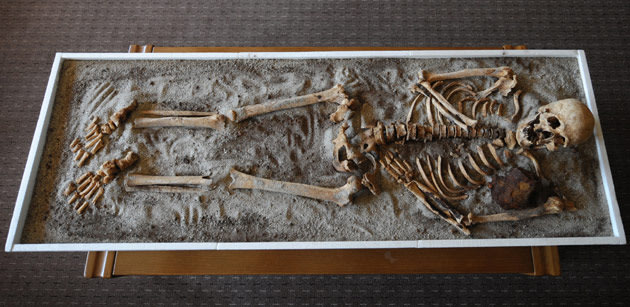US to claim disputed dinosaur skeleton
NEW YORK:
US authorities said they expect this week to seize a 70-million-year-old
dinosaur skeleton that was discovered in Mongolia more 65 years ago and
now is stored in New York and at the center of an international legal
dispute.A federal judge in New York has signed a warrant that allows the US Department of Homeland Security to seize the skeleton of the Tyrannosaurus bataar - an Asian cousin of the North American Tyrannosaurus rex - from Dallas-based Heritage Auctions.
"We should have it by the end of the week," said Luis Martinez, a spokesman for US Immigration and Customs Enforcement.
The seizure will be a "major step forward" for the government of Mongolia, which is claiming sovereign ownership and seeking the skeleton's return, said Robert Painter, a Houston attorney who represents Mongolian President Elbegdorj Tsakhia.
The skeleton - 8 feet (2.4m) tall and 24 feet (7.3m) long - has been stored in crates in New York City since Heritage sold it at auction to an unidentified buyer for more than $1 million on May 20.
At the request of the Mongolian government, a US District judge in Dallas issued a restraining order preventing the skeleton from being moved or the ownership transferred while the dispute is pending.
Manhattan US Attorney Preet Bharara filed a lawsuit seeking the forfeiture of the nearly intact skeleton and its return to the Mongolian government.
In New York, US District Judge Kevin Castel later issued an order to seize the fossil, ruling there was probable cause it was subject to forfeiture under federal laws.
"From a legal standpoint, the US government's lawsuit shifts the burden of proof from Mongolia to Heritage and others who might make a claim to its ownership," Painter said.
Heritage officials have said they will continue to cooperate with authorities. They say the skeleton was legally obtained and brought to auction by a reputable consignor.
"We believe our consignor purchased fossils in good faith, then spent a year of his life and considerable expense identifying, restoring, mounting and preparing what had previously been a much less valuable matrix of unassembled, underlying bones and bone fragments," Jim Halperin, co-chairman of Heritage Auctions, said in a statement. "We sincerely hope there is a just and fair outcome for all parties."
Federal officials said smugglers made false statements about the skeleton when it was imported into the United States from Britain in 2010. The skeleton did not originate in Britain nor was its value only $15,000 as claimed, they said.
The skeleton was discovered in 1946 during a joint Soviet-Mongolian expedition to the Gobi Desert in Mongolia's Omnogovi Province, Bharara said. Mongolia has had laws in place since 1924 prohibiting the export of dinosaur fossils that are considered national treasures and government property.
Heritage Auctions and the Mongolian government agreed in May to jointly investigate the ownership of the skeleton. Several paleontologists examined the skeleton several weeks ago and determined it was removed from the western Gobi Desert in Mongolia between 1995 and 2005. (Reuters)





























